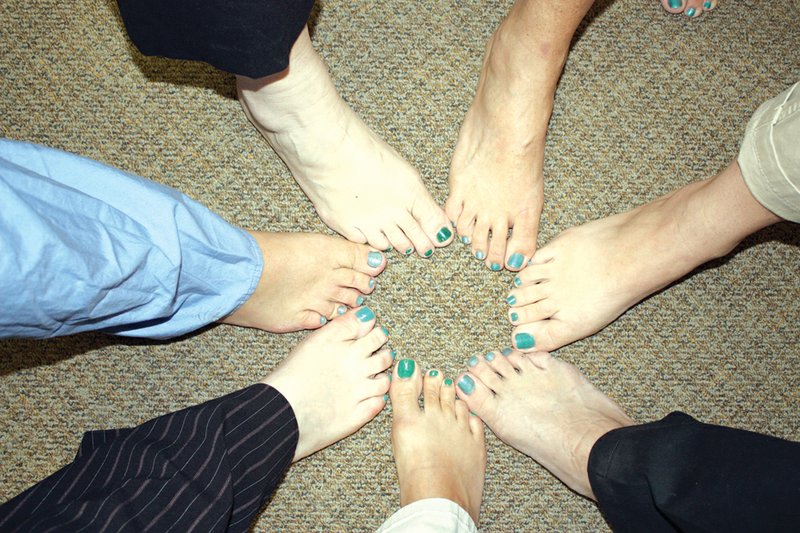Most people know that October is Breast Cancer Awareness Month and that the color for promoting awareness of the disease is pink. But what about ovarian cancer?
The Teal Toes Project is one way to promote awareness of ovarian cancer.
It may be a silent killer, but there is a group of women in Newport who are painting their toenails teal to shout out that September is Ovarian Cancer Awareness Month.
“We are all painting our toes teal this weekend,” said Rebecca Pearrow, director of marketing at Harris Hospital in Newport. “The hospital is a resource for community health education, and we continuously promote wellness and healthy choices.”
Today at noon, Dr. Karen Jones will speak at the hospital’s Lunch and Learn meeting in the community room at the hospital, which holds two lunches each month as a community outreach to educate the community on various health issues. There is no charge for the lunch, and it is open to the public.
Ovarian cancer may not receive as much attention as breast cancer simply because it is more uncommon.
“One in 70 women will get it, and that seems low compared to the one in eight women who will get breast cancer,” Jones said. “… In my 16 years of practice, I’ve only seen one case of ovarian cancer.”
That doesn’t mean the disease should be taken less seriously.
According to the Ovarian Cancer National Alliance, ovarian cancer accounts for approximately 3 percent of cancers in women. It is the ninth most common cancer among women, and it is the fifth leading cause of cancer-related death. Ovarian cancer is the deadliest gynecologic cancer.
Early detection is difficult, Jones said, and ovarian cancer is treated with surgery and chemotherapy.
“There aren’t any early-warning signs,” Jones said. “By the time you have symptoms, the survival rate is very low.”
Jones said there is no specific screening test to determine if someone has ovarian cancer, and usually when symptoms develop, the woman has full-blown ovarian cancer. She said the best detection is a yearly gynecological examination.
“A yearly gynecological exam could detect an ovarian mass, but the bad news is there’s not much of an early stage,” she said. “Either you don’t have it, or you have it really bad.”
Jones said if a patient has at least two first-degree relatives, such as a mother, aunt or sister, there are genetic tests that can be done to see if a woman has the cancer-causing gene.
The symptoms of ovarian cancer are pelvic and abdominal bloating; difficulty eating or feeling full quickly; and urinary symptoms, such as urgency or frequency.
Jones said that although those symptoms can be related to other health issues, if a patient has all of the symptoms on a regular basis, she should see her doctor.
“I see patients with those symptoms every day, but I’ve only seen one case of ovarian cancer,” Jones said. “Another symptom is if your pant size increases because of an increase in abdominal girth.”
Several health agencies are promoting the CA125 blood test for early detection, but Jones disagrees with this because conditions other than ovarian cancer can elevate the CA125 levels.
“The American College of Obstetricians and Gynecologists says not to do that test as a standard of care,” Jones said. “If someone has a benign ovarian cyst or endometriosis, that can make the CA125 levels elevated, too.”
She recommends the CA125 blood test for women who are at high risk for ovarian cancer. She also said birth-control pills can reduce the risk of ovarian cancer; however, some women may be concerned about the hormones from the contraceptives causing a greater risk of breast cancer.
“There’s been a question about hormones and breast cancer, but there’s not a direct link,” Jones said.
Because ovarian cancer doesn’t get as much recognition as breast cancer, Pearrow encourages women who are getting pedicures in September to choose teal; it’s a conversation starter to promote awareness of ovarian cancer.
For more information, visit the Ovarian Cancer National Alliance at ovariancancer.org; Teal Toes at tealtoes.org; or Harris Hospital at harrishospital.com.
Staff writer Jeanni Brosius can be reached at (501) 244-4307 or jbrosius@arkansasonline.com.
